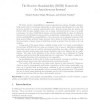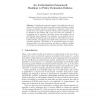883 search results - page 111 / 177 » The Semantics of Verilog Using Transition System Combinators |
IANDC
2007
13 years 9 months ago
2007
We define reactive simulatability for general asynchronous systems. Roughly, simulatability means that a real system implements an ideal system (specification) in a way that pre...
LOGCOM
2007
13 years 9 months ago
2007
The syntactic approach to epistemic logic avoids the logical omniscience problem by taking knowledge as primary rather than as defined in terms of possible worlds. In this study, ...
ESORICS
2010
Springer
13 years 10 months ago
2010
Springer
Abstract. In distributed computer systems, it is possible that the evaluation of an authorization policy may suffer unexpected failures, perhaps because a sub-policy cannot be eval...
SP
2002
IEEE
13 years 8 months ago
2002
IEEE
We introduce the RT framework, a family of Rolebased Trust-management languages for representing policies and credentials in distributed authorization. RT combines the strengths o...
SEMCO
2008
IEEE
14 years 3 months ago
2008
IEEE
Recognizing that information from different sources refers to the same (real world) entity is a crucial challenge in instance-level information integration, as it is a pre-requisi...


